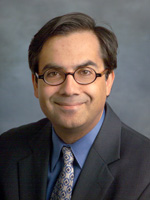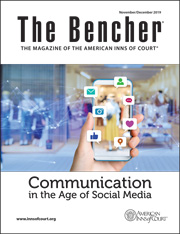Legal Ethics and Social Media
The Bencher—November/December 2019
By John P. Ratnaswamy, Esquire

 Just as Twitter posts are limited to 280 characters, there is a word limit for this column. So, there is only so much I can write here about lawyer ethical boundaries when navigating the vast firmament of social media.
Just as Twitter posts are limited to 280 characters, there is a word limit for this column. So, there is only so much I can write here about lawyer ethical boundaries when navigating the vast firmament of social media.
The starting point, as is the case with other activities that a lawyer might think of as not being lawyering as such, is that, in many situations other than the practice of law, the lawyer still is bound by many of the same ethical principles, and the lawyer may face discipline if the principles are violated. See my column “Application of Ethics Rules to Conduct Performed Outside of Legal Practice” in the July/August 2019 issue of The Bencher. For example, engaging in conduct involving dishonesty, fraud, deceit, or misrepresentation in social media is likely to raise concerns just as it does in other contexts. See, e.g., American Bar Association Model Rule of Professional Conduct (ABA MRPC) 8.4(c).
Another general concern is whether or when a lawyer’s activity in social media is, or may be seen as, advertising. The authorities relating to lawyer advertising and the internet most often involve websites, but there are instances involving blogs, and there might not be any conceptual barrier to seeing some other types of lawyer activity in social media as advertising. See, e.g., my column “Adopted Amendments to ABA Model Rules on Advertising” in the November/December 2018 issue of The Bencher; Hunter v. Virginia State Bar, 285 Va. 485 (Va. 2013) (rejects a lawyer’s First Amendment challenge to discipline based on failure to post disclaimer relating to discussion of past successes), cert. denied, 570 U.S. 919 (2013).
A lawyer engaging with non-clients in social media should be mindful of the risks that the interaction may be interpreted as forming an attorney-client relationship and/or the giving of legal advice to a non-client. See, e.g., ABA MRPC 1.18 (“Duties to Prospective Client”), ABA MRPC 4.3 (“Dealing with Unrepresented Person”).
A lawyer discussing current or past clients or matters—even closed matters for former clients that involve a published decision—should consider possible restrictions on such discussions, including possible limits on discussing information that is public but is not generally known. That subject is one that may have, as the cliché goes, traps for the unwary. See, e.g., ABA Standing Committee on Ethics and Professional Responsibility (SCEPR) Formal Opinion No. 479 (December 15, 2017) (“The ‘Generally Known’ Exception to Former-Client Confidentiality”); ABA SCEPR Formal Opinion No. 480 (March 6, 2018) (“Confidentiality Obligations for Lawyer Blogging and Other Public Commentary”). But see Hunter v. Virginia State Bar, cited above (under the First Amendment, the state may not prohibit an attorney from discussing information about closed cases involving a client or former client that is not protected by attorney-client privilege without express consent from client).
Judges and lawyers should consider possible implications of being “friends” in social media, which might include disqualification/recusal issues. See, e.g., ABA SCEPR Formal Opinion No. 462 (Feb. 21, 2013) (“Judge’s Use of Electronic Social Networking Media”); ABA SCEPR Formal Opinion No. 488 (Sept. 5, 2019) (“Judges’ Social or Close Personal Relationships with Lawyers or Parties as Grounds for Disqualification or Disclosure”); Law Offices of Herssein and Herssein, P.A., v. United Services Automobile Assoc., 271 So. 2d 889 (Fla. Nov. 15, 2018) (judge-lawyer Facebook friend status, standing alone, is not a legally sufficient basis for disqualification).
Finally, judges and lawyers also can be subject to ethical principles relating to use of the internet for factual research and investigation. See, e.g., ABA SCEPR Formal Opinion No. 478 (Dec. 8, 2017) (“Independent Factual Research by Judges Via the Internet”); ABA SCEPR Formal Opinion No. 466 (April 24, 2014) (“Lawyers Reviewing Jurors’ Internet Presence”).
The law in any given jurisdiction may vary, as the citations above illustrate.
John P. Ratnaswamy, Esquire, is the founder of The Law Office of John Ratnaswamy, LLC, located in Chicago. He also serves as an adjunct professor of legal ethics at the Northwestern University School of Law. Ratnaswamy served as a member of the Hearing Board of the Illinois Attorney Registration & Disciplinary Commission from March 2011 to February 2016. He is a former member of the ABA’s Standing Committee on Ethics and Professional Responsibility and is the current chair of the ABA Solo, Small Firm, and General Practice Division’s Committee on Ethics and Professional Responsibility. This column should not be understood to represent the views of any of those entities or Ratnaswamy’s or the firm’s current or former clients.